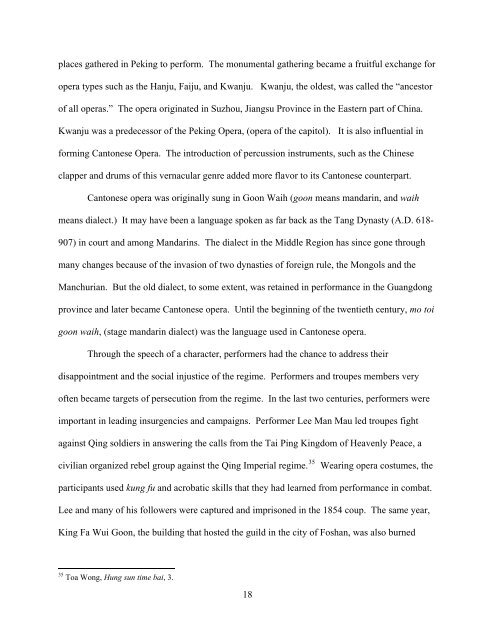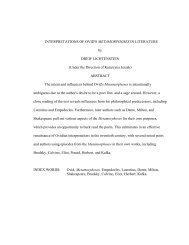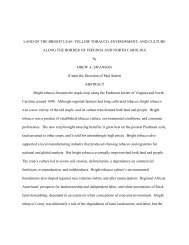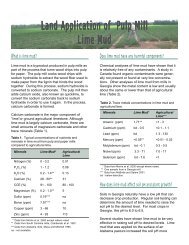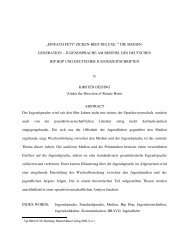RED BOAT TROUPES AND CANTONESE ... - University of Georgia
RED BOAT TROUPES AND CANTONESE ... - University of Georgia
RED BOAT TROUPES AND CANTONESE ... - University of Georgia
You also want an ePaper? Increase the reach of your titles
YUMPU automatically turns print PDFs into web optimized ePapers that Google loves.
places gathered in Peking to perform. The monumental gathering became a fruitful exchange for<br />
opera types such as the Hanju, Faiju, and Kwanju. Kwanju, the oldest, was called the “ancestor<br />
<strong>of</strong> all operas.” The opera originated in Suzhou, Jiangsu Province in the Eastern part <strong>of</strong> China.<br />
Kwanju was a predecessor <strong>of</strong> the Peking Opera, (opera <strong>of</strong> the capitol). It is also influential in<br />
forming Cantonese Opera. The introduction <strong>of</strong> percussion instruments, such as the Chinese<br />
clapper and drums <strong>of</strong> this vernacular genre added more flavor to its Cantonese counterpart.<br />
Cantonese opera was originally sung in Goon Waih (goon means mandarin, and waih<br />
means dialect.) It may have been a language spoken as far back as the Tang Dynasty (A.D. 618-<br />
907) in court and among Mandarins. The dialect in the Middle Region has since gone through<br />
many changes because <strong>of</strong> the invasion <strong>of</strong> two dynasties <strong>of</strong> foreign rule, the Mongols and the<br />
Manchurian. But the old dialect, to some extent, was retained in performance in the Guangdong<br />
province and later became Cantonese opera. Until the beginning <strong>of</strong> the twentieth century, mo toi<br />
goon waih, (stage mandarin dialect) was the language used in Cantonese opera.<br />
Through the speech <strong>of</strong> a character, performers had the chance to address their<br />
disappointment and the social injustice <strong>of</strong> the regime. Performers and troupes members very<br />
<strong>of</strong>ten became targets <strong>of</strong> persecution from the regime. In the last two centuries, performers were<br />
important in leading insurgencies and campaigns. Performer Lee Man Mau led troupes fight<br />
against Qing soldiers in answering the calls from the Tai Ping Kingdom <strong>of</strong> Heavenly Peace, a<br />
civilian organized rebel group against the Qing Imperial regime. 35 Wearing opera costumes, the<br />
participants used kung fu and acrobatic skills that they had learned from performance in combat.<br />
Lee and many <strong>of</strong> his followers were captured and imprisoned in the 1854 coup. The same year,<br />
King Fa Wui Goon, the building that hosted the guild in the city <strong>of</strong> Foshan, was also burned<br />
35 Toa Wong, Hung sun time bai, 3.<br />
18


